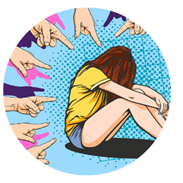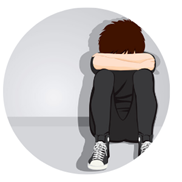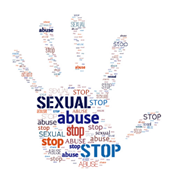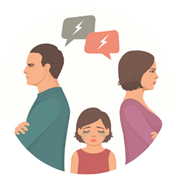If you feel worried about yourself, those people around you or what is happening in the world, please remember it can help to talk to others about this.
Growing up can be hard and confusing for everyone, but for some children it is more difficult than for others
Sometimes things happen that might not be ok or feel ok, or you might see or hear things on social media which makes you feel upset. It is important that you tell someone how you're feeling or what is happening. We know that talking with people can sometimes feel scary or worrying but everyone needs someone to talk with sometimes.
Talk to someone from Childline: 0800 1111
From Childline:
Lots of young people have told us that talking on the phone feels too scary, or that they’re worried about being overheard.
Talking on the phone can help in lots of ways, and the more you do it the easier it can feel. If you want to call but you’re struggling, if can help to:
 Bullying
BullyingBullying can have a massive impact on your mental health, both now and in the future. It doesn't matter if you're being bullied at school, at home or online, bullying can mess with your head. But you're not alone, and you deserve support.
Resources:
 Alcohol and Drugs
Alcohol and DrugsLots of young people want to know about drugs and alcohol - this doesn’t mean you have to take them or feel like you should just because people around you might be.
Some people also think that ‘legal highs’ are safe - the term is misleading as many so-called ‘legal highs’ have been linked to serious incidents and in some cases, death. If you're worried about any type of substance misuse, want help or advice the website below can help.
Resources:
Essex young people drug and alcohol service
 Missing/Homelessness
Missing/HomelessnessThere are many reasons you may feel your only choice is to run away. If you are thinking of running away, talk to someone – ideally an adult you trust, it could be a grandparent or aunt, your school nurse or the parents of your friends. Talk to someone who understands the things you’re going through.
If you run away you may be hurt or harmed while you’re away. If you're on the streets or in an unsafe place there is a danger of being raped, or being sexually exploited.
Shout 85258 is a free, confidential, 24/7 text messaging support service for anyone who is struggling to cope. They are there for people who are anxious, stressed, depressed, suicidal or overwhelmed and who need immediate support.
The Missing People helpline 116000 is also Free and confidential. The helpline is open 7 days per week, between 9am and 11pm. If you are missing, thinking of going missing, or someone you know is missing, we're here for you. You can call or text us, even if you have no credit on your mobile.
Resources:
Thinking of running away? A guide for young people from The Children's Society
Homelessness - If you have run away and find yourself homeless, help is available from:
Missing Chats - If you have been missing there will be the opportunity to have a Missing Chat. This is completely voluntary but could help identify, and resolve, the problems that caused you to run away so you don't feel the need to do it again.

Sexual abuse can include lots of things like rape and sexual assault, sexual harassment, online grooming and domestic abuse or violence. It can also include sexual exploitation (being pressure into having sex with someone in return for getting something like money or drugs), sexting or child pornography.
Consent means agreeing to do something. When it comes to sex, this means someone agreeing to take part in a sexual activity. Any sort of sexual contact without consent is illegal whatever the age of the people involved. More information on consent.
Resources:

Sometimes relationships are not happy places to be. Domestic abuse (also called domestic violence) happens when one person hurts or bullies another person who is or was their partner or who is in the same family. It can happen either when people live together or separately, and can also happen after a relationship has finished.
Although domestic abuse happens mostly between adults, young people can be affected by the abuse that they see and hear, and they can be hurt or bullied as part of domestic abuse between adults. You may also experience abuse from your own boy/girlfriend.
If someone in your family is abusive, remember it’s not your fault. If this is happening in your family, remember that you are not alone - there are people that can help you and your family. Everyone has the right to be and feel safe.
Resources:
Refuge - support for young people
 Family problems
Family problemsSometimes families face challenges and conflict. This can make you feel anxious, in a low mood and possibly also thoughts of self-harm. These feelings can affect other areas of your life such as school and friendships, so it's important to speak about your feelings with a friend or someone you trust so you can think of ways of coping or moving forward. It's important to remember family problems aren't your fault.
Resources: